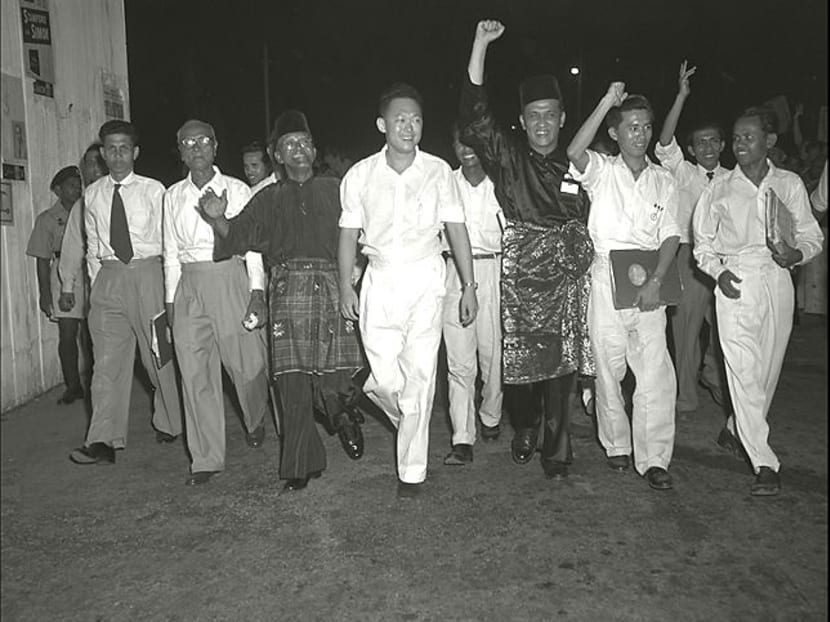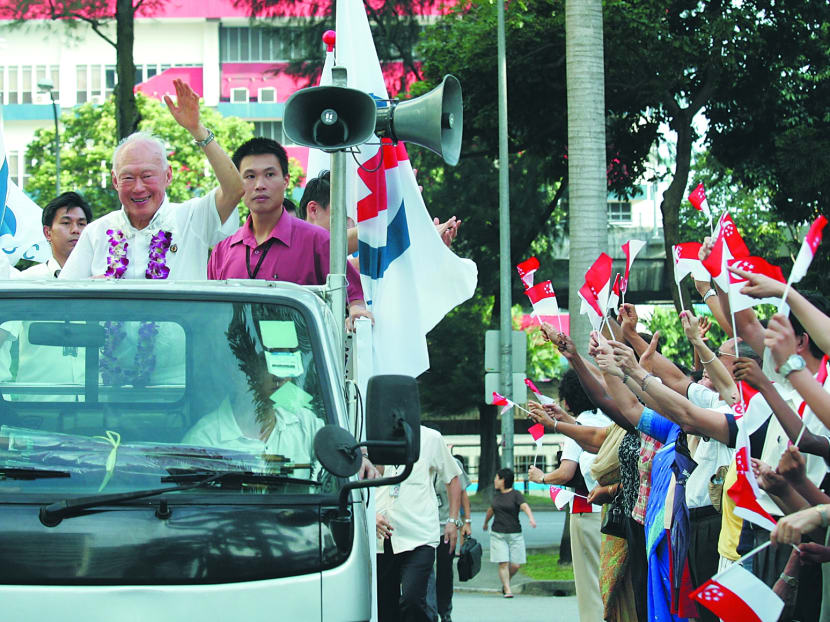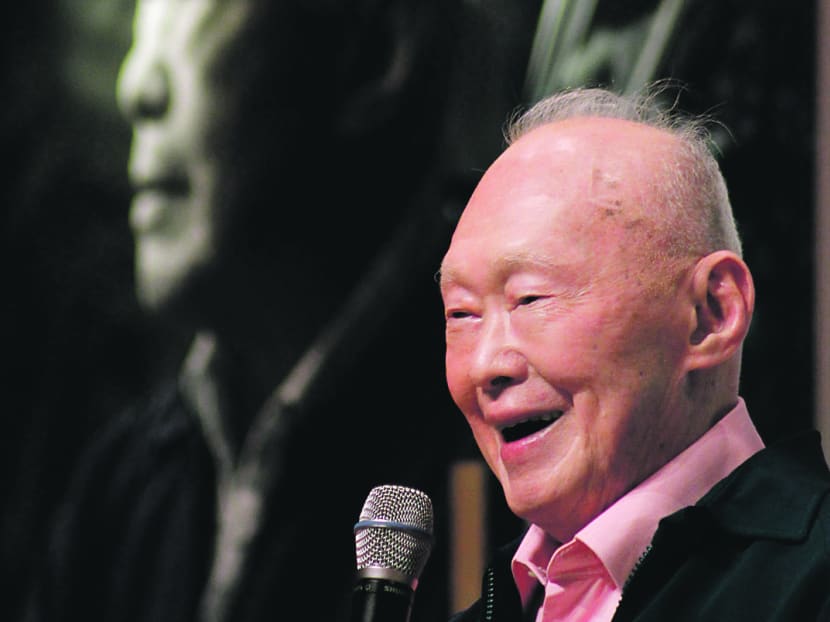‘All I can say is, I did my best’
When he breathed his last early this morning, the Republic’s first Prime Minister had also been Tanjong Pagar’s Member of Parliament for six decades — the longest-serving, and more remarkably, outlasting the last of his Old Guard leadership comrades by more than 25 years.



When he breathed his last early this morning, the Republic’s first Prime Minister had also been Tanjong Pagar’s Member of Parliament for six decades — the longest-serving, and more remarkably, outlasting the last of his Old Guard leadership comrades by more than 25 years.
Mr Lee died at 3.18am today at Singapore General Hospital, where he had been warded since Feb 5 after coming down with severe pneumonia. He was 91.
When Lee Kuan Yew entered the scene as a raw opposition politician in 1955, Singapore was but a colonial outpost populated by a polyglot of migrants, common only in their desires to eke out a livelihood here.
He departs having guided Singapore through the trying first years of Independence into a thriving economic miracle that is marvelled the world over for overcoming improbable odds.
Mr Lee has also elevated this fledgling nation’s place on the world stage far beyond that of ordinary city-states, partly because of its extraordinary achievements, but also because many global leaders have been floored by its leader’s astute analysis of geopolitical trends and developments — he continued this role even after handing over the reins after 31 years as Prime Minister by travelling the globe as a world-class pundit.
But Mr Lee’s enduring legacy is also the distinct brand of governance he had wrought, while the fundamental principles he adhered to in his 31 years as Prime Minister remains the bedrock on which Singapore’s steady ascension continues.
Opinions about him vary, from respect and worship, to fear and disdain, but few can quarrel with this: Singapore and Lee Kuan Yew were, are, and will continue to be indissociable. Such is Mr Lee’s imprint on Singapore.
If one had to distil the core principle of governance in Singapore, it would be meritocracy — Mr Lee determined early on that the government should equalise opportunities and not outcomes, and rewards must be allocated on the basis of one’s merits and abilities.
His firm belief stemmed from the “injustice” he saw in the 1950s when “the whites were on top” by default. “You might be a good doctor, but if you are an Asian, you would be under a white doctor who’s not as good,” he once recounted to a group of authors. “The injustice of it all, the discrimination, struck me and everybody else.”
He also wrote in his memoirs: “It struck me as manifestly fair that everybody in this world should be given an equal chance in life, that in a just and well-ordered society there should not be a great disparity of wealth between persons because of their position or status, or that of their parents.”
That governance of a vulnerable state sitting in a volatile region had to be neutral in terms of race, language and religion was buttressed by the deep misgivings the Republic’s first-generation leaders had with the Malaysian government’s politics of communalism during the brief, unhappy merger between the two from 1963 to 1965.
On independent Singapore’s founding on 9 August 1965, multiracialism was written into the Constitution — the first post-colonial state to do so.
It was the only way to forge a sense of nationhood for a people of mostly settlers, Mr Lee knew, and this togetherness was critical for a tiny island with a Chinese-majority population sitting amid far larger Malay neighbours.
“We took some drastic decisions at the beginning and shuffled the people together. Had we not done this, it would have led to a different Singapore,” he recalled in the book Hard Truths To Keep Singapore Going, referring to his Government’s dispersal of racial enclaves among various kampungs through balloting into public housing estates. Inter-racial mingling was key if the people were to identify themselves not only by their race, but also by their nationality, he decided.
“There must be a sense of self, a sense of identity, that you are prepared to die for your country, that you’re prepared to die for one another,” he added.
But diminishing the tendencies of communities to revert to communally-influenced behaviours was always going to be an arduous task: Racial enclaves again congregated in the various housing estate subsequently and a trend of voting along racial lines emerged in the 1980s.
Reflecting his resolve to entrench multiracialism in Singapore, Mr Lee introduced ethnic quotas for Housing and Development Board (HDB) blocks in 1989 and pushed through the Group Representation Constituency in 1988 to enshrine minority representation in Parliament, despite vociferous criticisms of these moves. Among other things, opponents said the quota constraints warped property transactions and the GRC system was counter-intuitive to meritocratic ideals.
Mr Lee was unmoved. “In Singapore, what will identify a Singaporean with the changing circumstances? An acceptance of multiracialism, a tolerance of people of different races, languages, cultures, religions, and an equal basis for competition. That’s what will stand out against all our neighbours.”
The clearest testament to his multiracial, and meritocratic principles towards governance was in the choice of “race-neutral” English as Singapore’s lingua franca, although Malay, as the language of the indigenous people, was retained as the national language.
“What motivated me? Internal stability and peace. We treat everybody equally. We judge you on your merits. This is a level playing field. We do not discriminate our people on race, language, religion. If you can perform, you get the job,” he explained.
To his mind, getting the best results from a meritocratic society also meant the government must not supplant individual effort and responsibility; people must not lose the drive to provide for themselves. That, and seeing in Britain and Sweden how debilitating it was to subsidise a man for the rest of his life, was why he eschewed welfarism, despite being a loyal supporter of the Fabian school of thought in his youth.
As he wrote in his memoirs: “We noted by the 1970s that when governments undertook primary responsibility for the basic duties of the head of a family, the drive in people weakened. Welfare undermined self-reliance. People did not have to work for their families’ wellbeing. The handout became a way of life. The downward spiral was relentless as motivation and productivity went down. People lost the drive to achieve because they paid too much in taxes. They became dependent on the state for their basic needs.”
To this day, the People’s Action Party (PAP) Government continues to tie individual effort and responsibility to many of its help programmes for the lower-income, such as the Workfare Income Supplement Scheme.
The creation of the Central Provident Fund (CPF) and the 3M healthcare financing system (Medisave, MediShield, and Medifund) are other examples of the Government’s drive to ensure that individuals themselves, and not the state, provide for most of their own needs.
Mr Lee realised that, as a country with no natural resources, the only way Singapore could survive, let alone thrive, was to have capable people leading it. His view was informed by how so many newly-independent former colonies had plunged into riots, coups and revolutions under inept leaders who had inherited sound constitutions from the British and French.
Indeed, Singapore’s vulnerabilities — “an 80-storey building standing on marshy land” — made it imperative that the political leadership was made up of the cream of society’s talent.
He said once: “Can you have a good government without good men in charge of government? American liberals believe you can, that you can have a good system of government with proper separation of powers between the Executive, the Legislature and the Judiciary, plus checks and balances between them ... and there will be good government, even if weak or not so good men win elections and take charge.
“My experience in Asia has led me to a different conclusion. To get good government, you must have good men in charge of government. I have observed in the last 40 years that even with a poor system of government, but with good strong men in charge, people get passable government with decent progress.”
It was a challenge that Mr Lee had started thinking about barely one year into Singapore’s independence.
And over decades, Mr Lee single-handedly devised the ways to spot and draft into government the capable, honest and dedicated, from schemes such as the Singapore Armed Forces overseas scholarships in 1971 to recruit the top brains — the PAP government has, over the years, had many of these scholars eventually become Cabinet ministers, including Prime Minister Lee Hsien Loong — to getting psychiatrists and psychologists to review potential candidates amid lengthy and thorough meetings with leaders that have become known as “tea sessions”.
He also spent years studying the hiring processes of multinational companies — eventually adopting in 1983 Shell’s system, which judged individuals for the “helicopter quality” of his or her powers of analysis, imagination and sense of reality — and was the chief advocate of pegging ministerial salaries to the six highest-paid individuals in the private sector so that the best would be willing to step into politics and be less susceptible to corruption.
“Because of our relentless and unceasing search for talent both at home and abroad to make up for the small families of the well-educated, Singapore has been able to keep up its performance,” said Mr Lee.
Not one to be beholden to ideologies and theories, Mr Lee cared only about whether a solution worked. He said once: “My job as a leader is to make sure that before the next elections, enough had developed and disclosed itself to the people to swing them around. That’s the business of a leader. Not to go follow the crowd. That’s a washout, the country will go down the drain.”
And where possible, Mr Lee “preferred to climb on the shoulders of others who had gone before us” in looking for solutions, an example of which was how he learnt, from his various trips overseas, ways to tackle the environmental problem by siting factories away from residential areas and implementing anti-pollution controls for traffic.
His pragmatic and empirical approach allowed him to be farsighted and visionary in his policies, which enabled Singapore to so swiftly transform itself from a mudflat to a metropolis.
At a time when Singapore was wrestling with the reality of being dismembered from its economic hinterland after Separation, for instance, Mr Lee and then-Finance Minister Dr Goh Keng Swee defied the then accepted wisdom that multinational companies were exploiters of cheap land, labour and raw materials in Third World countries, instead welcoming them to create a livelihood for Singaporeans and teaching them skills and knowledge.
The result? Singapore’s gross domestic product of US$970 million in 1965 was on par with Jamaica’s, but by the time Mr Lee stepped down in 1990, the figure had surged to US$34.5 billion, similar to that of the Czech Republic.
Mr Lee’s early emphasis on changing the physical landscape here quickly, to make Singapore, in his words, a “First World oasis in a Third World region” — clearing the city of street vendors, farmers and kampung dwellers, and his greening efforts — also played a significant role in the country’s rapid economic development.
As he explained in his memoirs: “Visiting CEOs used to call on me before making investment decisions. I thought the best way to convince them was to ensure that the roads from the airport to their hotel and to my office were neat and spruce, lined with shrubs and trees.
“Without a word being said, they would know that Singaporeans were competent, disciplined and reliable, a people who would learn the skills they required soon enough.”
Giving all Singaporeans clean and green environs also created a sense of equal-ness. “If we did not create a society which is clean throughout the island, I believed then and I believe now, we have two classes of people: The upper class, the upper middle and even middle class with gracious surroundings; and the lower middle and the working class, in poor conditions. No society like that will thrive,” he said in Hard Truths To Keep Singapore Going.
More than overhauling the look of Singapore from squatter settlements to orderly housing blocks through the impressive Five-Year Building Programme from 1960 to 1965 — the HDB built almost 55,000 housing units for the lower-income in that period, raising the proportion of the population in public housing from a tad over 9 per cent to close to one-quarter; the figure hovers at around 85 per cent today — Mr Lee’s housing policies over the years changed every Singaporean’s life.
His CPF Home Ownership Scheme in 1968 gave Singaporeans the chance to own a valuable asset — the Republic has among the highest home-ownership rates in the world today at over 90 per cent. His direction to HDB in 1974 to improve the quality and variety in HDB new towns, as well as the introduction of upgrading programmes for older estates in 1989, enhanced the value of these assets.
The result was that many Singaporeans, in a couple of decades, accumulated considerable assets.
Writing about the significance of creating a “home-owning society” in his memoirs, Mr Lee said: “I was convinced that if every family owned its home, the country would be more stable. I believed this sense of ownership was vital for our new society, which had no deep roots in a common historical experience.”
Mr Lee was nothing if not a keen attendant to every factor that would translate to Singapore’s continual success — even extending his hand into Singaporeans’ daily habits.
He proclaimed, to the shock of many, that as much as 80 per cent of a people’s, and hence the country’s, predisposition to success was down to nature. But Mr Lee also felt that culture was a key determinant in the equation.
He set about in earnest launching a series of campaigns to radically change Singaporeans’ habits and ethos, ranging from anti-spitting drives in the 1960s and eradicating the use of dialects, to extolling the “admirable qualities” of Japanese and, notoriously, banning chewing gum.
He did not care about the hectoring from critics about Singapore becoming a “nanny state”: “First we educated and exhorted our people. After we had persuaded and won over a majority, we legislated to punish the wilful minority. It has made Singapore a more pleasant place to live in. If this is a ‘nanny state’, I am proud to have fostered one.”
He also said: “We had one simple guiding principle for survival, that Singapore had to be more rugged, better organised and more efficient than others in the region. If we were only as good as our neighbours there was no reason for businesses to be based here. We had to make it possible for investors to operate successfully and profitably in Singapore despite our lack of a domestic market and natural resources.”
Mr Lee contentiously waded into the even more intimate aspects of Singaporeans’ lives; the “Great Marriage Debate” in his 1983 National Day Rally about the dangers of having “less bright people to support more dumb people in the next generation” because women graduates were not having enough children, and the “Stop at Two” and “Graduate Mothers” schemes testified to his determination to shape the make-up of Singapore society.
While Western commentators and media were often quick to highlight blemishes in Singapore and its system that Mr Lee built, world leaders, such as Mr Richard Nixon, Mrs Margaret Thatcher, and Mr Deng Xiaoping, frequently expressed their admiration and respect rather more readily.
Many leaders — of developed and developing countries alike — came with or sent their delegations here, and continue to do so, to study Singapore’s systems, including of housing, social security and industry, in a bid to replicate these back home.
For instance, Mr Tony Blair’s New Labour came to look at the CPF system — where once British MPs had slammed Mr Lee’s remarks that Mrs Thatcher’s government needed to trim the excesses of the welfare state — while the Vietnamese asked him in 1991 to become their economic adviser despite openly attacking his stance during its occupation of Cambodia just years prior.
But more than his policies and programmes, Mr Lee’s insightful views of global developments and their impact on the world, delivered in his inimitable straight-shooting style, were always keenly sought.
No less than former US Secretary of State Henry Kissinger paid Mr Lee this tribute: “There is no second Lee Kuan Yew in the world. Normally one would say that the leader of a country of the size and population of Singapore would not have a global influence … But precisely because Singapore can survive only by competition with much more powerful neighbours, and precisely because its well-being depends on stability and progress in the area, his views were always in a much larger context then the technical problems of the Singaporean economy and so he always had a tremendous influence on us.”
The doors of many world leaders, both past and present, were always open to Mr Lee — a mark of his stature and standing, given how few would dispense such treatment to the former prime minister of a small state, which less than half a century ago few had held out hope of survival.
Perhaps the most well-known testimony of Mr Lee as the seminal statesman came from Mrs Thatcher.
“In office, I read and analysed every speech of Harry’s. He had a way of penetrating the fog of propaganda and expressing with unique clarity the issues of our times and the way to tackle them. He was never wrong.”
That Mr Lee, throughout the years, had impressed, and forged close personal relationships with leaders around the world also benefitted the Republic on many fronts, ranging from security stability to economic opportunities.
His friendship with members of Harold Wilson’s government helped delay the British troops’ withdrawal to late 1971, thereby buying Singapore time to build up its own defence forces.
The strong personal bonds regional leaders such as Malaysian Prime Minister Tun Abdul Razak and Indonesia’s President Suharto shared with Mr Lee facilitated the founding of the Association of South-east Asian Nations in 1967, which helped foster a stable environment in which the Republic could grow.
And if not for Mr Lee’s place in the eyes of the Australian, Indonesian, and Taiwanese leaders, the Singapore Armed Forces might not have acquired the permission for much-needed training space.
The close ties he maintained with the United States laid the ground for the bilateral Free-Trade Agreement signed by his successor, Mr Goh Chok Tong, in 1993. And the mutual respect between Mr Lee and China’s Deng Xiaoping played a central role in Singapore’s being able to tap into China’s economy ahead of many others, such as the setting up of the Suzhou Industrial Project in 1994 and the Tianjin Eco-city subsequently.
Mr Goh noted: “Mr Lee’s good relations with them enable Singapore, and the leaders who came after Mr Lee, to ride on those good relationships.”
One reason for Mr Lee’s prominence as a statesman was the Western world’s regard of him as China’s interlocutor.
Said former British Prime Minister Tony Blair: “One of (the) things that Harry did incredibly effectively was he became the interlocutor of the emerging East with the Western countries, because if you’re an American leader or European leader, you talk in the same language. But he understands the West, he understands how we think, he understands how we work and he also has got these huge insights into China, the other major countries in your region, and so, he’s able to say to the Western leadership, ‘Look, this is how you want to think about this’.”
Mr Lee’s intimate knowledge of China stemmed from his early realisation of her emerging importance, and his efforts in pursuing closer ties, particularly with Mr Deng — whom he described as “the most impressive leader I had met”.
The admiration was mutual; Mr Deng looked to emulate Singapore’s growth model in attempting China’s opening-up. After one of his visits to Singapore, Mr Lee related in his memoirs, Mr Deng said China “should draw from their experience, and do even better than them”.
“After Deng’s endorsement, several hundred delegations, most of them unofficial, came from China armed with tape recorders, video cameras and notebooks to learn from our experience. Singapore had been given the imprimatur of their supreme leader.”
The awe-inspiring story of Singapore’s development was not achieved by Mr Lee alone, and he acknowledged the importance of Old Guard comrades such as Goh Keng Swee, S Rajaratnam, Hon Sui Sen, and Toh Chin Chye in his book: “I was fortunate to have had a strong team of ministers who shared a common vision. They were able men determined to pursue our strong goals ... They helped me stay objective and balanced, and saved me from any risk of megalomania which could so easily come with long years in office.”
But he largely set the tone and form of the Republic’s political system, the framework of which has endured to date. One of these unique features was an effective civil service machinery — Mr Lee had exacting demands of the bureaucracy, and indeed, never hesitated to dish out a dressing down when there was sloppiness — which was also “sensitive and responsive to the needs and moods of the people”. The future of Singapore, Mr Lee once said, was in the hands of “you, the admin machinery; (and) my colleagues and I, the political leadership”.
Thus, not only has the PAP government kept up Mr Lee’s unceasing obsession with succession planning, its leadership has also, like Mr Lee, continued to take a close personal interest in appointments in a wide range of institutions, such as statutory boards and trade unions.
The PAP government’s “knuckle-duster” approach to its opponents, be they opposition politicians or press critics, was a source of much criticism, however.
He has invited relentless scrutiny and labels such as “autocratic” and “draconian” with his libel suits — against politicians such as the late J B Jeyaretnam and Mr Chee Soon Juan, as well as publications including the Asian Wall Street Journal — but Mr Lee’s bottom line was that “wrong ideas have to be challenged before they influence public opinion and make for problems”.
Domestically, the press was free to operate, as long as it kept to the nation-building role he said was necessary for a young nation, counter to the West’s definition of it as a “fourth estate”.
Though Western advocates of democracy and human rights have attempted since the 1970s to press their standards on Singapore and other Asian societies, Mr Lee would not be moved — he emerged as the spokesman of sorts, with his “Asian values” argument, against the assertion that there was only one path of governance.
In other words, peculiar local circumstances had to dictate the form and workings of democracy, as he said in an interview with Foreign Affairs magazine in 1994: “It is my business to tell people not to foist their system indiscriminately on societies in which it will not work ... What are we all seeking? A form of government that will be comfortable, because it meets our needs, is not oppressive, and maximises our opportunities. And whether you have one-man-one-vote, or some-men-one-vote or other-men-two-votes, those are forms which should be worked out.”
Although he could have held on to power beyond 1990 — he was the world’s longest-serving prime minister then — Mr Lee decided not to do so, again with Singapore’s interests in mind.
“The sooner I give up, the younger I will be and the more active I can be to make sure that the team succeeds. I’ll be around to make sure that the team can succeed. The later I give up, the older and slower I will be, the more risky its success,” he explained.
And although he had his choice of successor — current President Tony Tan — Mr Lee let the incoming crop of ministers “contend amongst themselves and decide who will be the leader”.
Although he continued as Senior Minister and Minister Mentor, Mr Lee accorded Mr Goh and Mr Lee Hsien Loong, the Deputy Prime Minister and his son, the protocol demanded of their office, addressing them as “my Prime Minister” and seeing them in their offices, for instance.
For Mr Lee, all he was interested in was “to make sure that an error which is avoidable because of my experience should not be committed, if I can help it”.
He added: “I can’t tell them what to do as their great achievements, their great breakthroughs. That’s for them to work out with younger Singaporeans.”
Nevertheless, Mr Lee still spoke up whenever he deemed it necessary; stepping in during the acrimonious wage dispute between Singapore Airlines and its pilots in 2003, robustly advocating in Parliament the new formula for ministerial pay the following year, and his caution to Aljunied residents in the 2011 General Election about the consequences of their vote.
He has also consistently engaged younger generations of Singaporeans, attending dialogue sessions regularly with the tertiary institutions.
Outside of Singapore, Mr Lee assumed the role of consultant — he sat on several boards and committees — guest speaker (frequently, on China) and advocate of Singaporean business in his retirement.
For someone who never kept a diary because he said it would have “inhibited his work”, Mr Lee also made use of his time after stepping down to write his two-volume memoirs to remind younger Singaporeans that “we cannot afford to forget that public order, personal security, economic and social progress and prosperity are not the natural order of things, that they depend on ceaseless effort and attention from an honest and effective government that the people must elect”, as he wrote in one preface.
Through these, as well as other books by journalists he granted interviews to, Singaporeans were, for the first time, allowed a glimpse into the personal life of Mr Lee.
More than any other facet of his private life, it was Mr Lee’s falling in love, courtship, romantic secret marriage in the United Kingdom and deep love for Madam Kwa Geok Choo that most captivated many Singaporeans.
They learnt how Mrs Lee packed his luggage when he needed to travel, kept an eagle eye on his diet, and was the one on whom he depended to improve his speeches and writing. They read about how he made it a point to read Mrs Lee her favourite poems every night after she became bed-ridden after she suffered two strokes in 2008, how she most recognised his voice, and they saw and heard, at her funeral in 2010, how severely Mr Lee was devastated by the departure of his closest confidante.
For someone who had no religious faith, Mr Lee even turned to meditation to help himself cope.
Asked by a group of journalists about his greatest personal achievement, the man of whom most only saw the stern, strong public face for decades said: “I’m very happy that I’ve got a good, happy family. I’ve got a happy marriage. I’ve got three children I’m very proud of, I can’t ask for more.”
Despite his contributions to Singapore, Mr Lee’s muted personal appraisal of his life’s work could not have summed up better how he had gone about a duty he saw as his concern “till the end of my life”: “All I can say is, I did my best. This was the job I undertook, I did my best and I could not have done more in the circumstances. What people think of it, I have to leave to them. It is of no great consequence. What is of consequence is, I did my best.”
More in our Special Edition this afternoon (March 23).











